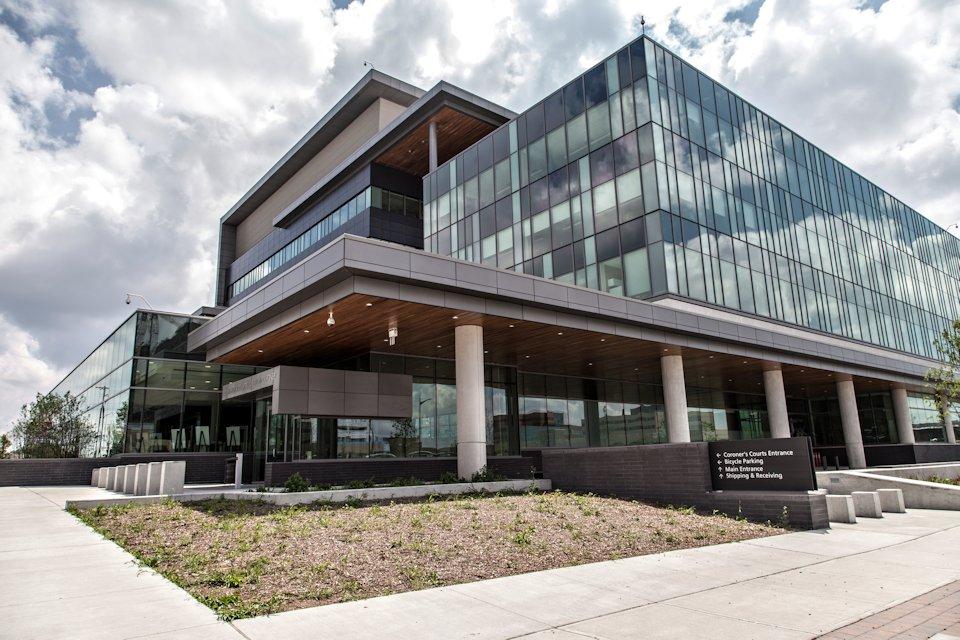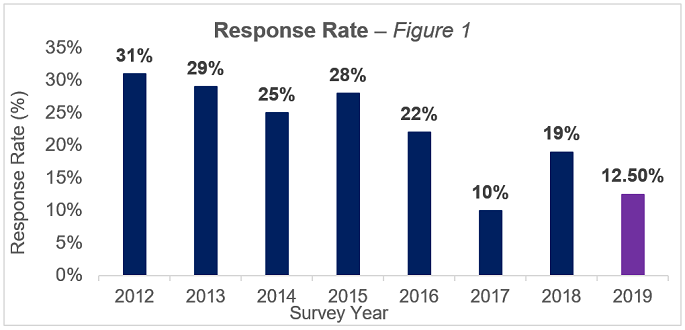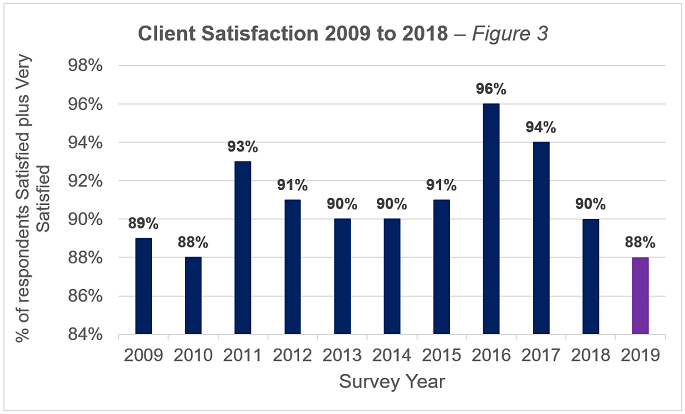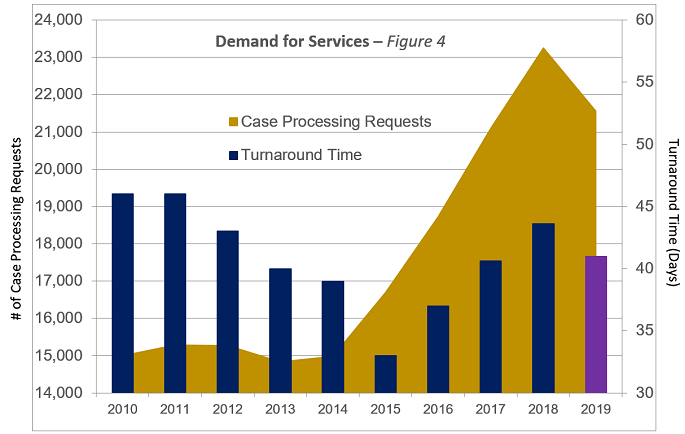
2019 Client Satisfaction
Performance Data > 2019 Client Satisfaction
2019 Client Satisfaction Survey Report - Executive Summary
Introduction
The Centre of Forensic Sciences (CFS) provides independent scientific laboratory services to support the administration of justice and public safety programs across Ontario. CFS clients include law enforcement officers, crown attorneys, defence counsel, coroners, pathologists and other official investigative agencies. Forensic science services include the provision of analytical test reports in the areas of biology, chemistry, documents, firearms and toxicology.
The CFS has measured client satisfaction on an annual basis since 2000. Client satisfaction measures are used by the Ministry of the Solicitor General to assess CFS performance. Obtaining feedback from clients is also a requirement of the accreditation standards to which the CFS adheres.
Executive summary
The client survey is used to evaluate the performance of the CFS against the organizational commitment to provide high quality forensic laboratory services in support of the administration of justice and public safety programs for all Ontarians.
In March 2020, 5,475 invitations to participate in the survey were successfully delivered, and 658 responses were received by the CFS (12.5% response rate). Compared to the 2018 client survey, 2019 saw a decrease of 6.5 points in responses (see Figure 1). This is likely due to the fact that the 2019 survey excluded 2018 recipients to prevent ‘survey fatigue’, which reduced the sample size of clients who were both eligible and interested in participating.
Responses to the 2019 survey reflect the CFS client population. The majority of respondents identified themselves as police officers (83%), which is also the main client group in terms of volume of submissions in 2019. The other survey respondents include coroners (6%), crown attorneys (2%), conservation officers (2%), pathologists (2%), fire investigators (1%), defense attorneys (1%), and other (4%).
New to 2019, clients were asked if they were interested in participating in smaller, targeted focus group-style consultations. Out of 658 respondents, 139 responses (24%) stated that they would be interested in this kind of engagement.
Overall client satisfaction is one of the broader performance measures that the CFS reports to the Ministry of the Solicitor General annually, with a target of 87%. Although the CFS has consistently exceeded its target of 87%, client satisfaction has been fluctuating recently. Between 2016 and 2019, client satisfaction decreased from 96% to 88% (Figure 3).
Since 2015, the CFS has experienced a continuing increase in the demand for services, with demand exceeding capacity. Thus, turnaround times are increasing, impacting client satisfaction. The recent reduction in case processing requests and turnaround time seen in Figure 4 was primarily due to the increased restrictions implemented in Biology Section in the acceptance of evidence in high volume (i.e. less serious) cases. Failure to have implemented these restrictions would have led to continued and unmanageable growth. Despite these high demands, 88% of respondents feel that the range of services offered at the CFS meets their needs.
Highlights
In the 2019 survey, clients were asked about their level of satisfaction in various key areas of interaction with the CFS:
online process of evidence submission
information and assistance provided by CFS staff
response-time for inquiries made by clients to CFS staff
scientific responses to technical questions made by clients
overall experience with laboratory reports
overall experience with training provided by the CFS
Client responses are summarized below:
76% of clients are satisfied with the online process of evidence submission, representing a 1% increase in satisfaction compared to 2018. It is worth noting, that 69% of open-ended responses relating to the web submission process reflected challenges with the system.
Respondents are generally satisfied with information provided (88%), time to respond (78%) and scientific responses to technical questions (76%). Compared to 2018 responses, these numbers are similar (within 2% in all cases).
71% of respondents agree that laboratory reports are easy to understand; 85% agree that lab reports are thorough; and 78% agree that reports provide sufficient detail. Similar to the 2018 survey, report comprehension continues to be identified as an area of improvement.
Since 2017, there has been a decrease in satisfaction relating to the range of CFS training offered. The 2019 results are similar to 2018 results, where ‘Not applicable’ and ‘Neutral’ responses continue to remain high, which suggests a lack of awareness regarding training opportunities at CFS.
Of 140 open-ended responses (21% of all respondents), 31% recognized and appreciated the high quality of services provided by the CFS.
2019 is the first year where case acceptance criteria have been identified as a key area, with comments suggesting that the criteria are too limiting or unevenly interpreted. Suggestions for improvement include reverting to previous less-restricted levels and providing materials to assist with the application of the criteria.
Regarding turnaround time (TAT), 16 comments indicated that current TAT is too long, with nine comments relating especially to the Toxicology section. Recommendations for improvement include securing additional resources and staff.
Looking ahead
The CFS is committed to client engagement and identifying opportunities to improve client experience. Efforts include:
Using client feedback to inform changes to the Web Submission Portal.
Developing of videos to help users navigate the web submission process.
Creating a Client Information Section on the Web Submission Portal to provide clients with fast and easy access to CFS resources.
Updating the Client Training Section of the Web Submission Portal to increase awareness and access to training opportunities offered at CFS.
Holding virtual consultations with CFS clients to discuss forensic science services.




